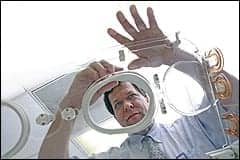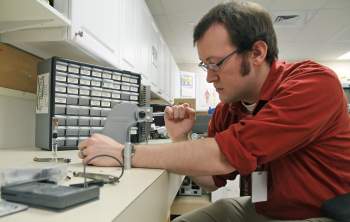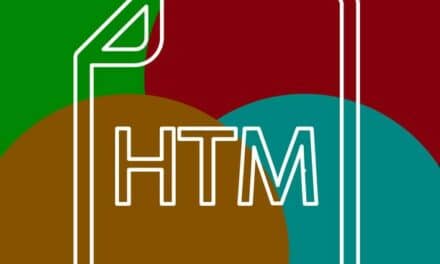Image above: Lynch serving in Escuintla, Guatemala.
By Chaunie Brusie
You could say that Patrick “Pat” Lynch, CBET, CCE, CHTM, CPHIMS, FACCE, of Fort Meadow, S.C., also known as “Chief Do-Gooder,” has always had a penchant for working hard. After all, he started working his first job at the age of 12, getting up at 4 a.m. every morning to deliver papers to the 200 customers along his route before heading off to school. “I liked having a pocket full of coins,” Lynch notes, wryly.
That unapparelled work ethic propelled Lynch along the career that has now spanned over 40 years in the biomedical engineering industry. But don’t expect Lynch to slow down just yet—he’s still got plenty of tasks left on his to-do list.
Pioneering His Path
Lynch’s resume is both expansive and impressive, reading like a laundry list of accomplishments. In addition to serving as a member of 35 regional biomed associations, Lynch is the founder and president of the nonprofit organization Biomeds Without Borders and has held posts at Global Medical Imaging (GMI), TriMedx, and Northside Hospital in Atlanta. He’s also served as a biomedical instructor for Engineering World Health and the chairman of the Clinical Engineering Board of Examiners for six years.
Plus, Lynch holds an MBA from Kennesaw State University in Georgia and is a certified healthcare technology manager (CHTM), a certified clinical engineer (CCE), and a certified biomedical equipment technician (CBET). And let’s not forget the awards: Lynch is the founding member and the first president of the North Carolina Biomedical Association, as well as the dual recipient of the American College of Clinical Engineering’s Advocacy Award. In 2014, he received another accolade: AAMI’s “HTM LeadershipAward.”
But behind the fancy awards and the notable accomplishments is a man who started with a passion for hard work and the insight to make his career happen. Lynch first discovered that he enjoyed working on machines when he began learning television repair from a neighbor. Although he was only 14 years old at the time (and yes, he was still working that paper route, too), Lynch immediately realized he had stumbled upon a valuable skill. “I got a great sense of accomplishment when I could take something broken and make it work again,” he says.
Lynch followed his early interests repairing broken TVs to a local technical college in Charlotte to purse a degree in electronics. From there, he started his first job in the biomed industry, repairing medical equipment for Spacelabs Healthcare. After gaining his initial experience in the field, Lynch moved to Sun Health and primarily repaired surgical equipment.
He also decided to re-enroll in school and earned his bachelor’s in electronics at the University of North Carolina. “I realized I was working with all these people that had these big long letters after their names—MD, RN, and all those sorts of things—and I decided I needed a few more credentials,” Lynch says.
While he was furthering his education and honing his skills, Lynch was also inadvertently blazing the biomed trail. He relates how, in a 900-bed hospital, he and one other colleague were solely responsible for repairing all of the equipment. “I did the OR; he did the rest,” Lynch says.
The equipment back then was limited to primarily heart monitors and infant incubators—and the incubators were so primitive that the door gaskets were actually made of asbestos and the “warming” light was just a 150-watt lightbulb. Luckily, as Lynch advanced in his career, so did the entire biomedical field.
A Hero at Heart
At only the age of 26, Lynch became the director of clinical engineering at Sun Health, before transitioning to regional director. After several years of intense traveling and a few other job changes, he began working with Charlotte, N.C.-based GMI on a speaking circuit, eventually speaking to everybiomedical association in the United States.Upon leaving GMI, he started his own consulting company, Lynch Consulting, and also purchased a race-timing business. “It keeps me out of trouble on the weekends,” Lynch quips.
Despite the twists and turns of his career path, Lynch has always been happiest when his work brings him closer to the patient. He harkens back to the early days, in which he would be called into the OR in the middle of surgery if a piece of equipment malfunctioned—and everyone, even the surgeon, would stand back, waiting breathlessly to see if he could fix it. “I loved being a hero,” he says.
And these days, he is continuing his work as a hero through his nonprofit organization, Biomeds Without Borders, which donates and repairs gently used medical equipment to developing countries. Lynch describes how the idea for Biomeds Without Borders came to him while traveling to Africa and Honduras to teach local professionals how to fix medical equipment.But while there, he realized that many of the areas he visited didn’t have equipment as simple as pliers to actually fix the equipment.
So, he created Biomeds Without Borders to advertise for, receive, and ship donations of medical repair equipment from hospitals. Items as seemingly small as duct tape, electrical tape, connectors, and wires and as large as one-or two-generations-old medical equipment (older equipment not reliant on computers actually function better in countries where electricity is limited) are donated and shipped across the ocean through his efforts.
About two to three times per year, Lynch and a team of volunteers go overseas and install and repair life-saving medical equipment. So far, Lynch has visited Rwanda, Africa, Haiti, Honduras, Lebanon, Guatemala, and Cuba, installing entire neonatal intensive care units and equipment such as patient warmers, incubators, physiological monitors, EKGs, and blood pressure monitors.
“[It’s] most gratifying; it’s a fun time, you get to see another part of the world, and you develop a deep appreciation for everything we have in the United States,” Lynch says of his time with the organization.
‘Chief Do-Gooder’
When you hear about all Lynch has accomplished, the 11-year-running, self-given moniker of “Chief Do-Gooder” starts to make sense. But make no mistake, Lynch doesn’t use the term as a way to boast about himself; instead, he sees it as a continuation of what his entire career has been about: serving others.
“I’ve done a lot of things in my career, and I’m very outspoken and I’ve probably made every single mistake that could possibly be made in this profession,” Lynch says. “And my job as Chief Do-Gooder is to share those mistakes that I’ve made with others so that they don’t have to make them.”
Today, Lynch is as busy as ever, but he does make time for the good stuff in life. He notes that he takes plenty of time off to work on his hobby as a certified trail master, spending five to 10 hours each week building and maintaining trails in his local public parks.
He also enjoys spending time with his family: Pat, his corporate attorney wife of 18 years, whom, incidentally shares the same name as him and shares in the raising of his granddaughters, Lashay, 9, and Alayah, 7. Both girls also share an affinity for their grandmother’s passion as a marathon runner and enjoy running with her in their after-school program. Lynch notes that raising young children later in life is a bit different than in his 20s and 30s. “I’m a much better parent the second time around,” he adds.
And like the good Southern gentleman he is, Lynch assures 24×7 Magazine that you can find him enjoying some downtime in the same spot almost every afternoon: at the wine bar, enjoying his Pabst Blue Ribbon beer and smoking his cigar. Because even Chief Do-Gooders need a break from time to time.
Chaunie Brusie is associate editor of 24×7 Magazine. Questions and comments can be directed to [email protected].






Well deserved recognition, Pat! I may have quibbled with you on some of your opinions but always highly respected your efforts to help the profession and, especially, people who live in low resource countries. Your big heart is in the right place!
I work with one of the Honduran biomeds that benefited from his training in Honduras. Very impressed! You did a great job, Pat!
My co-worker and I donated some tools and supplies to Pat and Biomeds Without Borders last year. I also had the privilege of having Pat come speak to my Biomed department about 12 years ago.
A fine recognition of a life well lived–and on going. Quibbling with Pat is/was never adversarial, it is like oxygen which fuels the mind and ignites new ideas.
It is very pleasing to see my friend Pat’s very generous contributions recognized. Keep it up Pat. You have a big heart.
I’m almost sure that Pat has good friends in all 50 states and I indeed can include myself as one of them. Hat’s off to you Pat! Dave
Excellent article for a very deserving individual. Pat has been a resource and a help to me over the years. Thank you Pat!
Hooray, hooray. I do believe Mr. Patrick Lynch has been the SINGULAR hero of the biomedical technician field my whole career. He is, if nothing else were to be said of him, rock solid consistent. He somehow transcends the Manager domain and the Technician domain to bring a cohesiveness to the entire field. Technicians, in the trench, often feel abandoned, even betrayed, by management’s seemingly detachment from what technician’s know and what management wants. Every manager wants more for less!! More often than not biomed delivers. THAT has been the crux of the problem. We unselfishly deliver. Every time (OK, nearly). Hence, whatever resources management has been giving biomed must be adequate. we don’t want adequate! We would much rather be leading edge, BUT, we don’t have the resources (time nor money nor personnel) to pursue that lofty goal that would ensure success of the equipment management program AND preclude crises which would require biomed’s intervention! Oh, we could do so much more!
As long as the healthcare system in in the black, management has the notion that it is doing everything well. Now THAT is scary!
Okay, getting down off my soap box now! lol